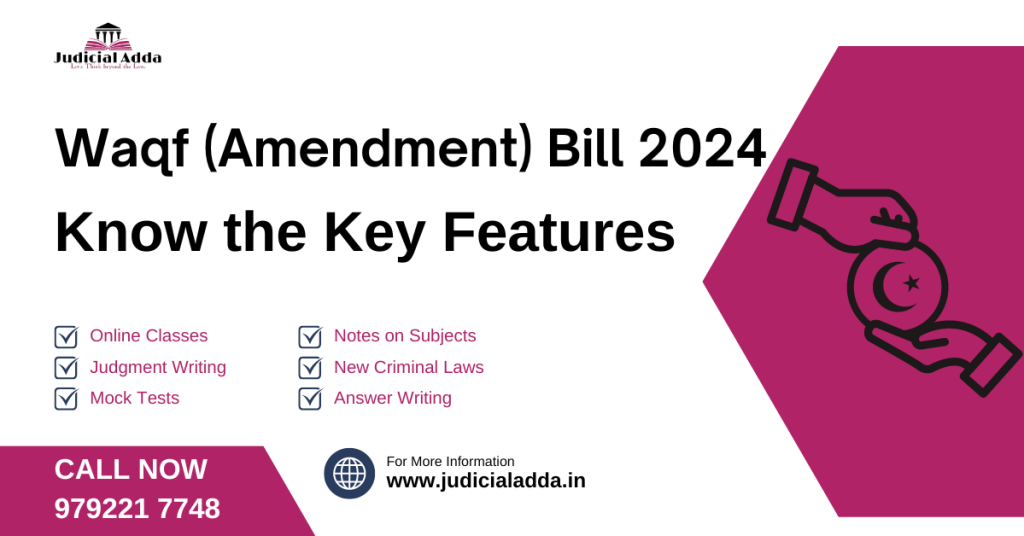
The Waqf (Amendment) Bill 2024
The Modi Government is overhauling the Waqf Act by introducing the Waqf (Amendment) Bill 2024 to restrict the unfettered powers of the Waqf Board which is surprisingly the country’s third largest landowner after the Indian Railways and Indian Armed Forces. Now, on 2nd August the Modi Cabinet has approved a total no. of 40 amendments to the Act. These changes are being rolled out by bringing in a bill in the Parliament.
What is Waqf?
Waqf is defined as a property that is given in the name of God for religious and charitable purposes. In other words, Waqf is the permanent dedication by any person of his property for any purpose recognized by the Muslim Law as pious, religious or charitable. The proceeds are used to go ahead and finance educational institutions, graveyards and of course importantly mosques and for shelter homes and madarsas also.
It is worth mentioning here that as per the Sharia Law, land that’s once given to the Waqf it cannot be reversed. Also, their holdings have actually surged in the last few years doubled since 2009.
History of Waqf Act
This act was first passed by the parliament way back in 1954. Subsequently, changes were made there. Later on, it was repealed and a new Waqf Act was passed in 1995, 2013. Again, the act was amended to give far-reaching powers to the waqf board to designate the property as Waqf Property.
Functions of the Waqf Board
Today every state has a waqf board. This board is headed by a chairperson and one or two nominees from the state government, Muslim MLA’s, Muslim MP’s, Muslim Members of the State Bar Council or Islamic Scholars. The board is given powers under the law to administer the property to take measures for the recovery of lost properties, and sanction the transfer of immovable properties. The board has also been granted unrestrained power under the law to register properties. Currently the Waqf boards possess 8,70,000 immovable properties, 16,173 movable properties and over 3,56,031 estates.
Proposed Amendments to the Act
The Waqf (Amendment) Bill 2024 was introduced in Lok Sabha on August 8, 2024. It amends the Waqf Act, 1995. The Act regulates waqf property in India. The bill renames the Act to ‘United Waqf Management Empowerment, Efficiency and Development Act, 1955. Key provisions of the bill are as follows –
- Firstly– the draft legislation is likely to propose the restructuring of Waqf Board. The amendments aim to enhance inclusivity and this is an important change. This will ensure women representation on all waqf boards.
- Secondly – the government makes it mandatory for waqf board to register its property at the district collector’s officer. So that all of the properties can be evaluated.
- Thirdly – all the properties will now undergo mandatory verification as well. As per the current act the waqf property cannot be challenged in any court.
The government also states that the Waqf Act was made with the aim of managing the waqf properties. But there’ no such act to regulate other religions for followers of other religions and that is the contention for bringing in these amendments.
Now, the Lok Sabha adopted a motion naming 21 members to the committee to review the Bill. This committee will also include 10 members form the Rajya Sabha and it’s required to submit its report by the end of the first week of the next parliament session.

How did the Rajya Sabha react?
Let’s understand how the Rajya Sabha reacted upon The Waqf (Amendment) Bill 2024?
In the Rajya Sabha, Opposition objected to the withdrawing of the Waqf Properties (Eviction of Unauthorized Occupants Bill of 2014. CPI(M) MP John Brittas and Indian Union Muslim League MP Abdul Wahab gave notices against Mr. Rijiju’s motion to withdraw the bill to “provide for the eviction of unauthorized occupants from Waqf properties”. Mr. Brittas said the Bill would serve to grab Waqf properties and the center’s intention was to create polarization. Mr. Wahab said that minorities about the new bill and opposed the withdrawing of the 2014 Bill. Chairman Jagdeep Dhankar put both the notices to vote and the Upper House rejected it by a voice vote.
Other members’ Views –
Opposition parties called the proposed amendments to the Waqf law “an attack on the constitution, interfering with religious matters and against the spirit of federalism”. Leading the charge, senior congress leader K.C. Venugopal called it a “draconian” bill and alleged that it was brought with an eye on the upcoming assembly elections in Maharashtra and Haryana.
In the contrary, Mr. Rijiju said that it merely sought to implement reforms suggested by committees that were set up by the previous congress government and neither were any rights being snatched nor was religious freedom being curtailed.
Many other BJP allies such as the Janata Dal (United), the Telugu Dasam Party (TDP) and the Shiv Sena (Shinde) supported the Bill on the grounds of transparency and reform.
The introduction of the Bill also witnessed a spat between Home Minister Amit Shah and Samajwadi {Party Chief Akhilesh Yadav after Mr. Yadav claimed that the government was proposing to curtail the powers of the Speaker but the opposition would fight for the Chair. Opposing the bill on the ground that it targets a particular minority, Nationalist Congress Party-Sharadchandra Pawar MP Supriya Sule said, “Look at what is happening in Bangladesh, there is so much pain. It is the moral duty of a country to protect minorities.”
Arguing that the Bill is an attack on the Basic Structure of the Constitution as it “violates” the principle of judicial independence and separation of powers, All India Majlis-e-Ittehadul Muslimeen Chief Asaduddin Owaisi said, “You are enemies of Muslims and this Bill is evidence of that.”
Contentions placed by Mr. Rijiju?
Hitting back to all these, Mr. Rijiju argued said that Modi Government had been forced to “undertake reforms: because the congress did not do so. He also cited the example of Tamil Nadu state where an entire village was declared Waqf land to underline the need for reform in the law.
He further added that there was no provision to challenge or review the order of the Waqf tribunal but now that was being changed to allow appeals to higher courts. “In our country, no law can be a super law and that can’t be above the constitution.







